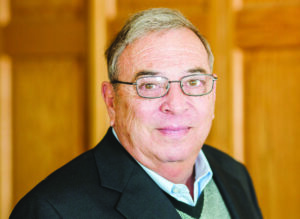Remembering Ned Chiodo
10/1/2025 Ned Chiodo could be grouchy and grumpy. He could be quarrelsome and argumentative. And, on bad days, he could be irritable and irascible. And, always, he was stubborn.
Ned Chiodo could be grouchy and grumpy. He could be quarrelsome and argumentative. And, on bad days, he could be irritable and irascible. And, always, he was stubborn.
And he was a really good guy.
He was a good guy because he cared about the city and the county and the state. He was a good guy because — street smart and book smart — he knew how to get good things done and to get bad things stopped. He was a good guy because he was fun to have breakfast or lunch with because he knew so much and was such a good story-teller.
And he was a good guy because he was, well, Ned Chiodo.
Chiodo, who died (for the second time) at age 83 on Sept. 4 of a massive heart attack at Methodist West hospital, was a Southside Italian who, like some of his pals, would rise to get his hands on the levers of government here.
But Chiodo wasn’t one of those guys who grew up in poverty. His dad owned the Union Tavern at Second and Locust downtown, all but next door to the Trades and Assembly Hall where several unions were headquartered and to the City Growers Market, where many Italians worked and others marketed their produce.
So he was steeped in Democratic politics from the time he was small.
Like seemingly every boy who grew up on the south side, he was also steeped in the finer points of baseball and basketball and football. Still today, if you go to an Iowa Cubs game or a Drake basketball game with any of those guys, you’d think each was a former Major League manager or NBA coach. And, of course, they were all better umpires from the bleachers than the man behind homeplate.
And while he loved all sports — he volunteered as an assistant coach and scout for his alma mater, Dowling High School — golf was where he excelled. As a young man, he managed the driving range and miniature golf course the family had installed on a plot of land it owned on East 14th Street — and in 1971, while still in his 20s, he made a deal to manage the non-golf operations at Blank Golf Course, the city’s new nine-hole course on the south side. In 1973, he became a PGA-certified golf pro.
“He was a really good player,” his son Jeff said the other day. Indeed, he shot five holes in one along the way.
In 1976, he ran for the Iowa Legislature as a write-in candidate in the primary to get on the Democratic ballot for a legislative seat, and he won by more than 500 votes. He then went on to serve in the Iowa House until 1985, and then was elected to a term as Polk County Auditor.
After leaving elective office, he set up a very successful lobbying and political consulting company.
And then he died.
He was in failing health — he had been diagnosed with amyloidosis, a relatively rare disease that strikes about 14 out of every million Americans. It can affect any organ — wherever the abnormal protein, the amyloid, lands — and with Ned it mainly affected his heart. He underwent a stem-cell transplant at the Mayo Clinic in 2005, and later, while still at the Mayo Clinic, his heart stopped. He had no heartbeat for three minutes before doctors brought him back, Jeff Chiodo remembers, adding, “I was with him both times he died.”
In fact, Ned Chiodo was given what amounted to a third chance. Most people diagnosed with amyloidosis live but a few years. Chiodo lived 20. He was believed to have been the longest-survivor of the disease.
After he got better, Chiodo decided he could run Blank better than the city did. He was right. The city had been subsidizing its golf operations at Blank, Waveland and Bright Grandview with several hundred thousand dollars a year. So about 20 years ago, he and his son Jeff made a deal to operate all three courses — by then, Blank had been expanded into an 18-hole course, a course Ned Chiodo helped design. So, they made a deal with the city.
It turned out to be a good deal for everyone: the city eventually was making several hundred thousand dollars annually on the golf operation, and, by all accounts, the Chiodos did OK, too.
And so did the golfers. “We rarely get any complaints” about Ned’s operation, a city official says.
The city and Jeff Chiodo seem about to extend the deal for 15 years.
• • •
Chiodo’s funeral was at St. Anthony’s Church, where he grew up and where his younger brother, Frank, would one day become the monsignor in charge. Ned is survived by his wife, Marilyn, his four sons — Frank, Jeff, John and Joe — and 11 grandchildren, most of whom would never have known him if he hadn’t come back from the dead 20 years ago.
Friends would occasionally rib him about that day he died the first time. “Geez, Ned,” they’d say. “You’ve been given a second chance. Maybe you could be a nicer guy this time around.” They said it lovingly.
Chiodo would just smile a bit, and then harrumph. ♦
Michael Gartner was born and raised in Des Moines. Along the way, he has been a top editor at The Wall Street Journal, editor and president of The Des Moines Register, president of NBC News, majority owner of the Iowa Cubs and co-owner of CITYVIEW. In 1997, he won a Pulitzer Prize for editorial writing while at the Ames Tribune, where he was editor and co-owner.














